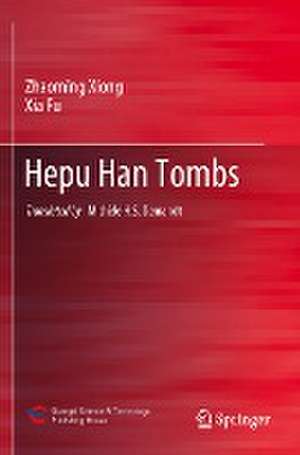Hepu Han Tombs
Autor Zhaoming Xiong, Xia Fu Traducere de Michèle H.S. Demandten Limba Engleză Paperback – 28 sep 2023
From the 2nd century B.C. to the 3rd century A.D., the Hepu Port served as the eastern starting point of the Maritime Silk Road, opening up trade and cultural exchange with countries in Southeast Asia, South Asia, West Asia, and the Mediterranean world, which resulted in a vast maritime trade network between China and the West. And these artefacts provide important evidence about this route, which also confirm the records of Chinese official history books. Therefore, the Hepu Han Tombs is of great significance to the study of ancient Chinese history and cultural exchanges between China and the West.
| Toate formatele și edițiile | Preț | Express |
|---|---|---|
| Paperback (1) | 556.40 lei 38-44 zile | |
| Springer Nature Singapore – 28 sep 2023 | 556.40 lei 38-44 zile | |
| Hardback (1) | 645.79 lei 3-5 săpt. | |
| Springer Nature Singapore – 27 sep 2022 | 645.79 lei 3-5 săpt. |
Preț: 556.40 lei
Preț vechi: 695.50 lei
-20% Nou
Puncte Express: 835
Preț estimativ în valută:
106.46€ • 111.16$ • 88.11£
106.46€ • 111.16$ • 88.11£
Carte tipărită la comandă
Livrare economică 01-07 aprilie
Preluare comenzi: 021 569.72.76
Specificații
ISBN-13: 9789811946622
ISBN-10: 9811946620
Pagini: 243
Ilustrații: XIV, 243 p. 227 illus., 200 illus. in color.
Dimensiuni: 155 x 235 mm
Ediția:1st ed. 2022
Editura: Springer Nature Singapore
Colecția Springer
Locul publicării:Singapore, Singapore
ISBN-10: 9811946620
Pagini: 243
Ilustrații: XIV, 243 p. 227 illus., 200 illus. in color.
Dimensiuni: 155 x 235 mm
Ediția:1st ed. 2022
Editura: Springer Nature Singapore
Colecția Springer
Locul publicării:Singapore, Singapore
Cuprins
Hepu Political District and Historical Geography in the Han Dynasty.- Excavation and research of Hepu Han tombs over the years.- The type of the Han tomb in Hepu.- Funeral Vessels of Hepu Han Tomb.- The stages and development of Hepu Han tombs.- Hepu Han Tombs and the Maritime Silk Road.- Multicultural fusion reflected in Hepu Han Tomb.- Discovery of City Sites Related to Hepu Han Tomb.- The practical significance of the study of Hepu Han tombs.- References.
Notă biografică
Zhaoming Xiong is Professor of Guangxi Minzu University and Doctor of History, Special Allowance Expert of the State Council. The research direction is Qin and Han archaeology and cultural exchanges between China and the West. Since 2002, he has continued to carry out archaeological excavations and subject research related to the remains of Hepu Port in the Han Dynasty and published about 50 related papers and excavation reports at home and abroad, published 9 books independently or as First Author.
Xia Fu is Associate Researcher of Guangxi Minzu University and Doctor of History. The research field is archaeology in historical period. She has been engaged in the excavation and research of Hepu Han tomb and city site for many years and published more than 10 related papers and excavation reports in journals such as “Journal of Archaeology” and “Archaeology” and participated in the writing of 3 books.
Textul de pe ultima copertă
This is the first book to systematically study the Hepu Han Tombs. Covering an area of about 68 square kilometers, the Hepu Han Tombs is one of the largest-scale and best-preserved ancient tombs in China. In 2001, the remains of 1,056 grave mounds could be seen on the earth surface and it was estimated that almost 10,000 tombs still survived underground. In the last 60 years, over 1,200 tombs have been excavated at Hepu, with approximately 20,000 artefacts unearthed which include pottery, bronze, iron, gold and silver ware, jade, lacquer, glass and bead ornaments. Especially to deserve to be mentioned, a large amount of artefacts can be related to the Maritime Silk Road.
From the 2nd century B.C. to the 3rd century A.D., the Hepu Port served as the eastern starting point of the Maritime Silk Road, opening up trade and cultural exchange with countries in Southeast Asia, South Asia, West Asia, and the Mediterranean world, which resulted in a vast maritime trade network between China and the West. And these artefacts provide important evidence about this route, which also confirm the records of Chinese official history books. Therefore, the Hepu Han Tombs is of great significance to the study of ancient Chinese history and cultural exchanges between China and the West.
Caracteristici
Is representative large-scale Han Dynasty tombs in Southern China (BC202~AD220) Reflects the formation process of a pluralistic integrated civilization in South China Explores the cultural exchanges by sea between China and the West in the Han Dynasty
